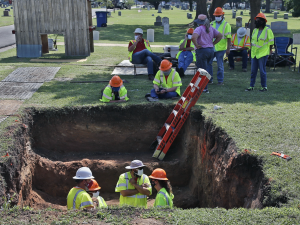Supporters say cynicism among Black voters is proving challenging for the reparations movement
SAN FRANCISCO — In the fight for reparations, organizers are crisscrossing California to persuade people like Aziza Kamara-Amimi to join their cause.
After a recent Sunday service at San Francisco’s Glide Memorial Church, Kamara-Amimi, 43, joined about 50 other churchgoers in the basement to hear a pitch for the state’s multibillion-dollar reparations proposal for Black Californians. She has long believed that reparations are needed to repair the Black community after centuries of government discrimination, but entered the meeting skeptical of its chances.
After listening for about 30 minutes to two members of the secretary of state’s office outline the plan proposed last year, which includes $1 million for some older Black residents, the corporate diversity consultant’s hand shot up.
“We have been talking about this for years, people have been fighting for this for years,” Kamara-Amimi, who is Black, said. “And still all we are doing is talking and talking, and I don’t see any real progress being made.”
“What’s the real solution?” she said to applause from the racially diverse group.
Reparations advocates are facing an unexpected hurdle: deep skepticism from the very people their proposals are designed to help — Black residents.
Sign up for the About US newsletter to get more stories on race and identity
The movement was already grappling with how to gain the support of Asian and Latino residents, who make up the majority of the state’s population and who polls have shown largely oppose reparations, as do the majority of White residents. And the state’s $37.9 billion budget deficit was expected to pose another political hurdle.
But the cynicism among Black voters is proving just as challenging, advocates say.
It comes as advocates prepare to make a critical push in the state legislature this month to implement key parts of their proposals, including establishing the California American Freedman Affairs Agency to oversee reparations programs. In the months ahead, advocates are also planning public education campaigns, community listening sessions and rallies at the Capitol, hoping to get more Black Californians enthusiastic enough to push state lawmakers to start debating reparations.
But lawmakers preparing to introduce a slew of reparations bills acknowledge that they face an uphill battle.
“I’m approaching this session with great caution and understanding that we’re a long way from achieving our goals,” said state Sen. Steven Bradford (D), who is Black and has introduced the bill to create the reparations agency. “But everyone’s looking to make sure that we get this right in order to be an example for not only the other 49 states, but the nation as a whole.”
Advocates say that in order to turn reparations from an academic debate into a political reality, they must first close what they call the “hope gap,” the chasm among Black voters who support reparations but believe they are politically unfeasible. According to a Washington Post-Ipsos poll conducted last spring, 75 percent of Black Americans said the government should compensate descendants of enslaved people, yet only 14 percent believed it would happen in their lifetimes.
If Black residents, who make up 6.5 percent of California residents, don’t believe in reparations enough to apply political pressure on state leaders, the movement could stall, advocates worry.
“If Black folks don’t believe that reparations are possible, then no other community, either other people of color or White people, will really get on board with this,” said Trevor Smith, who leads the Reparations Narrative Lab, an initiative of Liberation Ventures, which advocates for reparations.
The promise of reparations could also help build enthusiasm among Black voters nationally, a key demographic for Democrats looking to hold on to the White House and make gains in Congress, advocates say.
“There are people who support this and would be more politically engaged if this were a part of our political discourse,” said Rep. Jamaal Bowman (D-N.Y.), who has been lobbying the Biden administration to embrace reparations in time for the presidential election. “But it isn’t, so they’re staying home or some are even moving to the Republican Party because it feels like Democrats are taking Black voters for granted.”
Joe Biden said during 2020 election that he supported a study on reparations for Black Americans, but he has resisted calls from advocates to issue an executive order to establish one. “The President has supported Congress’ efforts to study reparations and the continued impacts of slavery,” said Robyn Patterson, assistant press secretary at the White House.
What to know about California’s reparations proposal for Black Americans
After two years of often-emotional public hearings, California’s first-in-the-nation reparations task force voted in May to approve a 1,100-page reportdetailing more than a century of anti-Black government-sanctioned discrimination and outlining more than 100 recommendations for undoing that harm. In addition to dozens of policy changes, the commission recommended that millions be dispensed to those who had suffered from various forms of discrimination.
But since its splashy release, the proposal has failed to spark much action.
Even those who initially supported the commission’s work, including California Gov. Gavin Newsom (D), who hailed the panel as a historic step forward for Black Americans, have largely been mum about implementing its recommendations.
In a statement, Newsom said he continues to have productive conversations with the California Legislative Black Caucus about the issue and is “committed to further building upon California’s record of advancing justice, opportunity, and equity.”
Across the country, advocates worry that if reparation efforts stall in California, where Democrats hold the governor’s office and supermajorities in both chambers of the legislature, it will signal to Democrats in other states that recompense to Black Americans isn’t politically possible.
Advocates have already suffered a stinging defeat in liberal San Francisco.
Last year, a local reparations task force — separate from the state panel — called for a package of recommendations that included $5 million payouts to some Black residents. Mayor London Breed (D) initially backed the idea and agreed to set aside $4 million over two years to establish a local office of reparations.
But just months later, Breed, who is Black, called for eliminating the office before it even opened. Amid the city’s $800 million budget deficit, the money should go to other city initiatives aimed at supporting Black residents, Breed said. The mayor has also said that reparations would be better handled at the federal level.
“The Mayor does not believe that addressing the needs of the African American community requires adding more bureaucracy and a whole new office,” Breed’s office said in a statement.
The decision left reparations advocates “extremely disappointed,” said Shamann Walton (D), a member of San Francisco’s Board of Supervisors who introduced the legislation that started the city’s reparations initiative.
But, he said, the movement will outlast the mayor’s resistance.
“My hope is that the city’s deficit is eliminated quickly, so that we can fund the Office of Reparations and fulfill the commitment made to address the historical injustices and inequities that have persisted for generations for Black San Franciscans,” he said.
Meanwhile, advocates have scored a victory in New York.
In June, the state legislature there passed a bill creating a reparations commission to study offering recompense to Black residents, much like the California panel.
Concerned that Gov. Kathy Hochul (D) might not sign the bill, Nicole Carty, the executive director of Get Free, an advocacy group, got to work. The nonprofit flew a pro-reparations banner during the Macy’s Thanksgiving Day Parade, held rallies across the city and delivered hundreds of letters to the governor’s office calling on her to sign the legislation.
After a six-month advocacy campaign, and even a memo from New York City’s comptroller making an economic argument for reparations, Hochul signed the legislation in December.
Get Free, which has focused on organizing voters younger than 35, now has its sights set on California, Carty said. “Momentum like this helps Black people begin to see that we could actually win and gives us the space to feel hopeful that we could actually get there,” she said.
At a recent meeting of community organizers at Cal State East Bay’s Oakland Center, Chris Lodgson, who has been working closely with members of the state’s reparations commission to sell its proposals to voters, had a dire warning.
“If we don’t achieve reparations, we’re not going to make it as a people,” Lodgson said.
Lodgson ran through a list of national data points: Black households with college degrees have, on average, less wealth than households led by White Americans who didn’t finish high school; the typical Black family with a head of household working full time has less wealth than the typical White family whose head of household is unemployed; Black two-parent families have half the wealth of White single parents.
“I can say the same for every other thing that they tell us we have to do to be successful,” he said. “It’s going to work for some of us, but it’s not going to work for all of us because something is missing. And what’s missing is the wealth that we’ve created for this country and had taken away from us.”
There were audible gasps as Lodgson rattled off the data. For him, that’s a good sign.
He ended his presentations by telling his audience of 50 community organizers that the country is closer than ever to paying reparations to Black people. That’s when it usually begins to click, he said, that the commission’s proposals have a real chance.
But some in the crowd remained skeptical.
“I hear what you’re saying,” Jeanette Harper, a community organizer from Oakland, said after Lodgson’s speech. “But if you talk to Black folks in the community, they are going to tell you, they need to see it to believe it.”
Derrick Muhammad, executive director of a housing nonprofit, said he agreed with Lodgson about the dire situation facing Black Californians. But he remained unconvinced that reparations are possible in a state with such a small Black voting base.
“I 100 percent support reparations,” said Muhammad, who is Black. “But when everyone else, whether they be White, Latino or Asian, hear reparations, the only thing they hear is free money for Black folks, and their first question is, what about me?”
Lodgson has heard this type of frustration before, he says, and came prepared.
“We have a bit of a Catch-22 here,” Lodgson told them. “In order for things to happen you need more people to believe and organize, but in order for people to believe and start to do things, they need to see some action already.”




